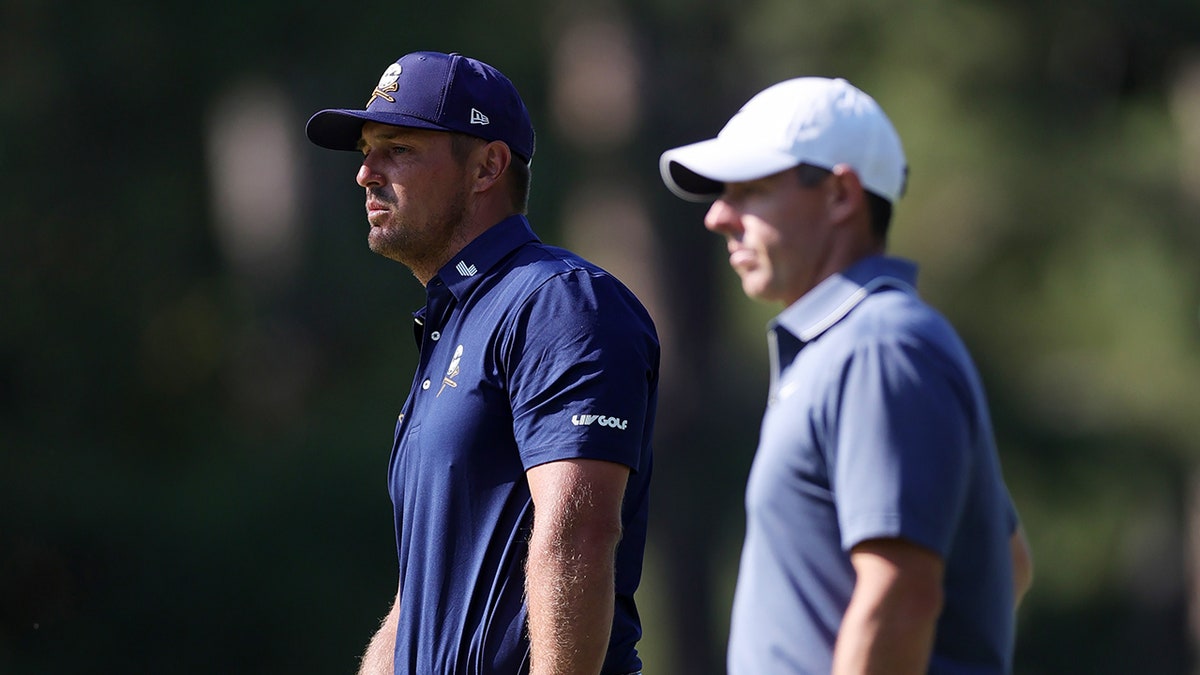Bryson DeChambeau vs. Rory McIlroy: The Ryder Cup War That Shattered Golf’s Gentleman Image
The Ryder Cup was supposed to be golf’s crown jewel — a celebration of skill, national pride, and sportsmanship. But at Bethpage Black in Farmingdale, New York, from September 26–28, 2025, it morphed into something far darker. What unfolded wasn’t just a tournament — it was a circus of chaos, fury, and humiliation that has left the golf world stunned.

At the epicenter of it all: Bryson DeChambeau and Rory McIlroy. Two titans of the modern game, locked in a bitter feud that turned the weekend into a spectacle more suited to professional wrestling than the fairways of golf.
A Tournament in Flames
From the opening tee shot, the energy was hostile. The New York crowd — rowdy, intoxicated, and electric — set the tone. Beer cans rained down. Chants turned venomous. Players clashed with hecklers. The Ryder Cup, once sacred ground, descended into something close to a riot.
By Saturday, the atmosphere had reached a fever pitch. On the 15th hole, a spark turned into a firestorm. Bryson’s caddie and European star Justin Rose exchanged words, the argument escalating until both men had to be physically restrained. Cameras captured every second. Social media exploded within minutes. The incident was instantly dubbed the “Bethpage Blowup.”

And just like that, the spotlight turned to DeChambeau and McIlroy — two men on a collision course.
Bryson Fans the Flames
If anyone thought cooler heads would prevail, Bryson DeChambeau proved otherwise. In his post-round interview, he didn’t try to calm things down — he poured gasoline on the fire.
“This,” he grinned, “is Ryder Cup intensity. Some of those guys across the pond love their theatrics.”
It was a dagger aimed directly at McIlroy. A not-so-subtle accusation that Europe’s biggest star was stoking drama. The jab sent the press into a frenzy and made headlines worldwide.

McIlroy Breaks
McIlroy, meanwhile, was visibly shaken. The Irishman has built a career on composure under pressure, but this time the chaos cut deep. Fans had turned from rowdy to abusive. One incident, in particular, crossed the line: a beer can allegedly struck his wife, Erica.
The fury boiled over in the press room. McIlroy abandoned his polished media persona and lashed out. He branded sections of the crowd as “disgraceful” and accused organizers of losing control. For the first time in years, McIlroy looked less like a champion and more like a man under siege.
Golf’s Civil War
As the dust settled, two narratives emerged — and they couldn’t be more different.
On one side stood DeChambeau, who embraced the chaos like a gladiator, basking in the boos and turning them into fuel. To his supporters, he was the warrior golf desperately needed — a showman who could carry the sport into the modern age.
On the other side stood McIlroy, the voice of tradition and dignity, trying to drag the Ryder Cup back from the brink. To his fans, he wasn’t just defending himself — he was defending the very soul of the sport.
The result? A civil war within golf itself. Commentators, fans, and even players split into factions. Some celebrated the raw emotion, arguing that golf needed the drama. Others condemned it as the death of etiquette and sportsmanship.
Aftershocks of Bethpage
The fallout has been seismic. Tournament organizers have launched a full-scale review of security protocols. Players are reportedly demanding tighter controls on crowd behavior. Sponsors are quietly voicing concerns about their brands being linked to violence and scandal.
But perhaps the most important consequence is the rivalry itself. The DeChambeau–McIlroy feud is now bigger than golf. It’s a cultural story, spilling beyond the sport’s traditional audience. The Ryder Cup — once a genteel clash of nations — has become a battleground of egos, chaos, and broken traditions.
A Line Crossed Forever
As the echoes of Bethpage reverberate, one chilling question lingers: Is this the new Ryder Cup?
If so, it means the sport has crossed a line from which it may never return.
The Ryder Cup was supposed to unite golf. Instead, it tore the game apart. And with Bryson DeChambeau and Rory McIlroy refusing to back down, the world now waits for the next chapter in a rivalry that may redefine golf forever.
